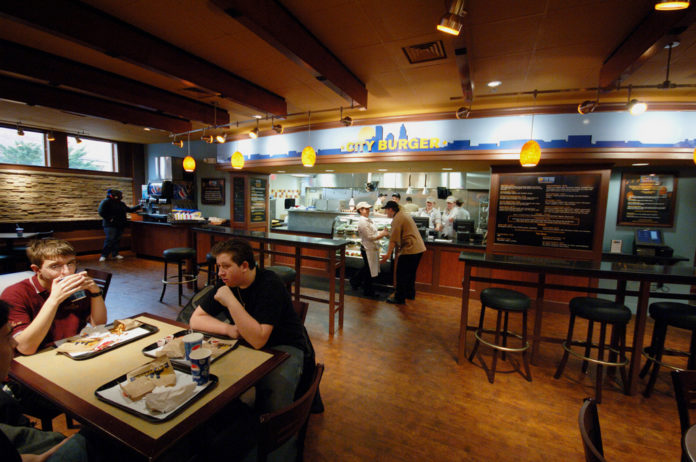
Johnson & Wales University senior Kimberly Lagana doesn’t know where she’ll be working in May, when she graduates from the food-service management program, but she’s getting training in a downtown campus dining spot that’s more like a restaurant than a cafeteria. It’s a distinction she hopes will lead to a job in the field.
She’s a front-of-the-house manager at City Burger, a dining hall opened in Johnson Hall – on Chestnut Street – earlier this year. It replaces Chestnuts dining hall on the ground floor, which includes a new Starbucks. Both operations on the floor have about 2,500 square feet.
It’s not your normal dining hall, Michael Downing, executive director of Practicum Properties, a Johnson & Wales department, is quick to point out. It’s a new concept for the university, offering grilled fare and better student jobs in a student-only restaurant.
“It really is part of an overall strategy to take a look at all the services we provide to students throughout the university,” he said. “In looking at the food service on campus, this is one of the early projects.”
In the same retail vein as the Starbucks and Panera Bread chains, City Burger’s food choices – mostly burgers and salads – are cooked-to-order “casual and quick,” Downing said.
At the nearby Rhode Island School of Design, there are three similar cafés. They’re a step away from the more “traditional” dining offered at The Met, the dining hall where most freshmen eat, said Ginnie Dunleavy, RISD’s director of dining and retail.
The café program started about three-and-a-half years ago with the Watermark Café – inside the RISD Store – and was followed by The Portfolio Café, opened about three years ago at the entrance to the Fleet Library on Westminster Street. Last year, RISD opened the Jolly Roger on Benefit Street.
Where RISD’s cafés differ from the Johnson & Wales City Burger concept is they are open to the public. But patrons are still about 70 percent students, Dunleavy estimated. City Burger is only open to students and faculty – but accepts cash and student dining cards.
And both schools say the interior designs distinguish their restaurants.
At RISD’s The Portfolio Café, alumni designed the orange chairs, wall treatments and lighting.
“There are three café models, so if you were in there and there weren’t the millions of students who come in right at lunchtime, you would not necessarily know you were in a college dining hall,” Dunleavy said.
The urban RISD – spread out over either side of the Providence River – also gains some cohesion and valuable student interaction from its satellite dining cafés, Dunleavy said. After freshman year, students choose their majors and fan out around the campus. Many stop going to The Met and instead going to these cafés with students in their major field of study.
“It’s important here at RISD because we have such a portable student base,” Dunleavy said. “Our students spend such an amount of time in our studio and they need to have access to food, but they also want to go where they have to go.”
City Burger offers flat-panel TVs, hardwood floors and a working fireplace.
Johnson & Wales hopes its casual design will give students a different experience from the traditional campus dining hall, Downing said.
City Burger is also a place for students to relax in comfort, getting away from Downtown Providence for a few minutes, he said. “It’s very busy, so we just want to have it dedicated to students,” he said. “We want it to be their space.”
Lagana, the student manager, takes advantage of that, she said. “Yes, I eat here. I get a salad every day.” •










